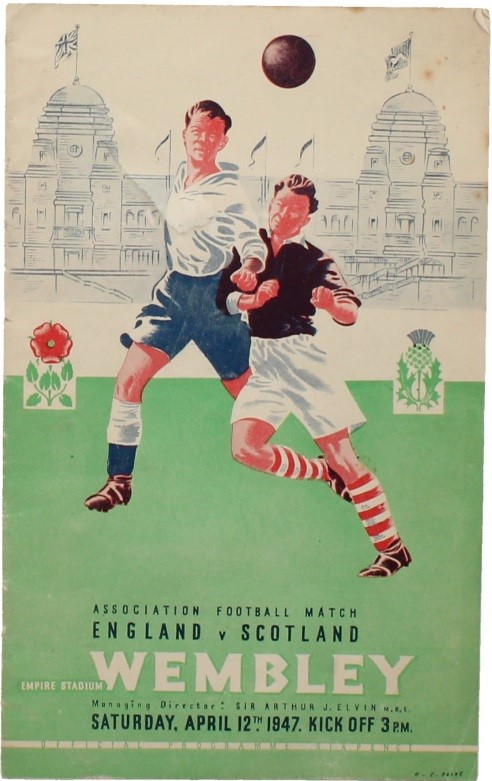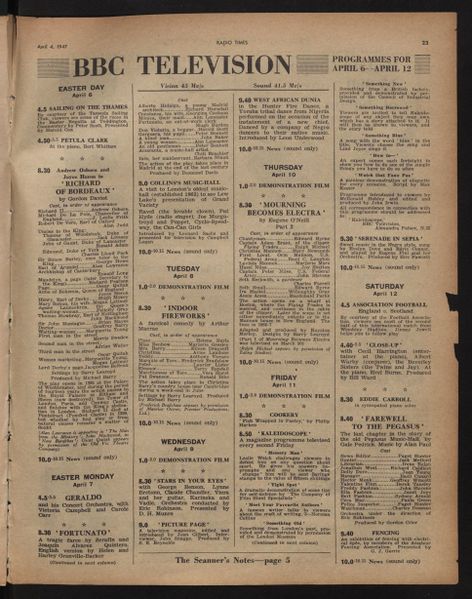England 1-1 Scotland (partially found footage of international football match; 1947)
On 12th April 1947, England hosted Scotland at Wembley Stadium as part of the 1946-47 British Home Championship. Occurring in front of a record crowd at Wembley at 98,250, it saw England claim its 27th title after the game ended 1-1. From a television standpoint, the encounter was the first international football match televised by the BBC since the Second World War.
Background
The 1946-47 British Home Championship was the first official instance of the annual football competition to occur following the end of the Second World War.[1] There was an unofficial 1945-46 competition held as part of the Victory International, with Scotland earning the title after winning all three matches.[1] Heading into the clash on 12th April 1947, England were performing strongly, leading the group after having beaten Ireland 7-2, and Wales 3-0.[2] In contrast, Scotland were struggling, losing 3-1 to Wales and being held to a 0-0 draw by Ireland.[2] Thus, England needed just a point to claim the title from Wales, whereas Scotland could only finish as joint-runners up at best.[3] Additionally, national pride was still at stake with this clash.[4]
Meanwhile, the BBC had revived its Television Service on 7th June 1946.[5][6] Upon re-opening, BBC Television Service did broadcast a few matches prior to the England-Scotland game, including an Athenian League football match between Barnet and Wealdstone, as well as a 1947 FA Cup fifth round match featuring Charlton Athletic and Blackburn Rovers.[7] Before the Second World War forced BBC Television Service to cease transmissions, it had only broadcast two international matches, one featuring England and Scotland for the 1937–1938 British Home Championship, and the other featuring England beating a Rest of Europe side in 1938.[8] Just like the 1938 game, the England-Scotland clash of 1947 would serve as a prelude to that year's FA Cup Final, which also occurred at Wembley Stadium two weeks later.[9] Commentary was provided by Jimmy Jewell.[6][10][11]
However, whereas the 1938 clash was broadcast in full, the 1947 encounter would not receive that luxury. Following the Second World War, the Labour Government had imposed rationing that restricted domestic electricity usage.[12] Therefore, to comply with these rations, the BBC were given permission to only televise the final 35 minutes.[6][12][10][11] Even televising 35 minutes might have proven controversial, as the BBC's decision to air 40 minutes of the 1947 FA Cup Final led to many complaining to Radio Times that Labour was imposing double standards considering the extent of electricity required to televise the match.[12] Nevertheless, the BBC responded that televising the matches was critical for both entertainment purposes and for being of national significance.[12]
The Match
The match was also significant in that it drew a then-record attendance for Wembley Stadium at 98,250.[13][14] Another notable detail of this match was it began the debate on whether England's Stanley Matthews or Tom Finney should play, with Matthews being selected to start. Norman Giller noted that both players were deemed "exceptionally gifted" but it was never really decided by England to play both players simultaneously, causing long debate from fans and newspapers on who was more deserving to play on the right wing.[14]
Whereas England were most likely favourites to win considering their form as opposed to Scotland's, it was actually the visitors who controlled the first half.[15] Indeed, Scotland's Archibald Macauley and Alexander Forbes were credited by various reports for controlling the midfield, to the extent England's midfield were unable to replicate their form in the previous two games.[15][14] At the 15th minute mark, Scotland took the lead when Thomas Pearson achieved a strong pass to Andrew McLaren, who broke away from the middle to score for his team.[15][14] Scotland continued their assault against a home side struggling to withstand the pressure, with Lawrence Scott almost conceding a penalty following a possible handball.[15]
In the second half, England appeared more confident, and it showed with some early shots.[15] In the 56th minute, Tommy Lawton and Wilf Mannion initiated a sweeping movement that was converted by Raich Carter, thus achieving the equaliser.[15][14] Following the equaliser, England were back to their form showcased in earlier games, and were seemingly more likely to score the winning goal.[15] It almost became a reality when Carter started racing towards shooting without being challenged only for him to stop running upon hearing an ultimately rogue whistle.[14][16] He began running again and attempted a shot that was saved by William Miller.[16] Thus, the game ended 1-1, allowing England to clinch the title with five points, ahead of Ireland, who was on three points after beating Wales 3-1.[2] Scotland finished last in the group.[2][3]
Availability
Like all early television programs, the England-Scotland match was televised live and was unlikely to have been directly recorded. Although there were means of achieving this following the Second World War, recording seldom occurred until video tape was perfected in the late-1950s.[17] Thus, televised footage of the match is most likely permanently missing. Nevertheless, a few minutes of match footage from British Pathé's newsreels remains publicly accessible.
Gallery
Videos
Image
See Also
Association Football/Soccer Media
- 1937 FA Cup Final (partially found footage of football match; 1937)
- 1938 FA Cup Final (partially found footage of football match; 1938)
- 1939 FA Cup Final (partially found footage of football match; 1939)
- 1947 FA Cup Final (partially found footage of football match; 1947)
- 1955 Scottish Cup Final (partially found footage of football match; 1955)
- 1966 FIFA World Cup Final (partially found original colour film of international football match; 1966)
- Arsenal 7-1 Hibernian (lost footage of charity football match; 1952)
- Arsenal vs Arsenal Reserves (lost footage of early BBC televised football match; 1937)
- Barbados 4–2 Grenada (partially found soccer match footage; 1994)
- Barnet 3-2 Wealdstone (lost footage of Athenian League football match; 1946)
- Brian Clough's Football Fortunes (lost DOS port of football management game; 1987)
- Charlton Athletic 1-0 Blackburn Rovers (lost footage of FA Cup match; 1947)
- England 0-1 Scotland (partially found footage of international football match; 1938)
- England 3-0 France (partially found footage of international football match; 1947)
- England 3-0 Rest of Europe (partially found footage of international football match; 1938)
- Falkirk 3-2 Newcastle United (lost footage of football match; 1953)
- Hallo! Bundesliga (lost GolTV series; mid 2000s-mid 2010s)
- Juventus 1-7 A.C. Milan (partially found footage of Serie A football match; 1950)
- Scottish Universities 1-1 English Universities (lost footage of international football match; 1952)
- Serbia vs Albania (partially found footage of abandoned UEFA Euro 2016 qualifying match; 2014)
- United! (lost British soap opera; 1965-1967)
Early BBC Sports Television
- 1931 Epsom Derby (lost televised footage of horse racing event; 1931)
- 1937 International Imperial Trophy Race (lost footage of motor race; 1937)
- 1937 Wimbledon Championships (partially found footage of tennis tournament; 1937)
- 1938 Ashes Series (partially found footage of international test cricket match; 1938)
- 1953 British Grand Prix (partially found footage of Formula One race; 1953)
- Archery (lost early televised toxophily; 1937-1938)
- The Boat Race 1938 (partially found footage of rowing race; 1938)
- Catch-As-Catch-Can Wrestling (lost early BBC televised professional wrestling matches; 1938-1939; 1946-1947)
- Darts and Shove Ha'penny (lost early BBC televised darts matches; 1936-1939)
- England 16-21 Scotland (partially found footage of rugby match; 1938)
- Horace Lindrum vs Willie Smith (lost footage of televised snooker; 1937)
- Woods and Jack (lost early televised lawn bowls; 1937; 1946)
Early BBC Television
- Alexandra Palace's wartime television demonstrations (lost footage of private television transmissions; 1943, 1945)
- An Inspector Calls (lost television adaptation of play; 1948)
- Ann and Harold (lost early BBC drama television series; 1938)
- BBC Election Night (lost coverage of British general elections; 1950-1951)
- The Care of Your Car (lost early BBC motoring show; 1947)
- Cook's Night Out (lost early BBC cooking show; 1937)
- Craftsmen at Work (lost early BBC documentary show; 1938, 1946)
- Dish of the Month (lost early BBC cooking show; 1937)
- First Aid (lost early BBC medical show; 1937)
- Foundations of Cookery (lost early BBC cooking show; 1939)
- Marcel Boulestin television shorts (lost early BBC programs; 1937-1939)
- Masks through the Ages (lost early BBC history talk show; 1937)
- Opening of the BBC Television Service (partially found coverage of inaugural day of high-definition television service; 1936)
- The Orchestra and its Instruments (lost early BBC music talk show; 1937)
- RCA recording of BBC Television Service (found footage of pre-Second World War BBC television broadcast; 1938)
- Sea Stories (lost early BBC talk show; 1936-1937)
- Spelling Bee (lost early BBC game show; 1938)
- Telecrime (lost early BBC crime drama; 1938-1939; 1946)
- The Wasp's Nest (lost early BBC television adaptation of Agatha Christie short story; 1937)
- Weaponless Self-Defence (lost early ju-jitsu television program; 1936-1937)
- The World of Women (lost early BBC talk show; 1937)
Early Sports Television Media
- 1934 Philo T. Farnsworth broadcasts (lost early television demonstrations; 1934)
- 1936 Summer Olympics (lost television coverage of Berlin Games; 1936)
- 1938 Pennsylvania Quakers football season (lost early televised college football games; 1938)
- 1960 Daytona Races (lost CBS and NBC televised footage of NASCAR prelude events to Daytona 500; 1960)
- Bill Longson vs Whipper Billy Watson (lost footage of professional wrestling match; 1947)
- Brooklyn Dodgers 2-5 6-1 Cincinnati Reds (lost footage of MLB doubleheader; 1939)
- Brooklyn Dodgers 23-14 Philadelphia Eagles (lost footage of NFL game; 1939)
- Columbia Lions 1-2 Princeton Tigers (partially found footage of college baseball game; 1939)
- Fordham Rams 34-7 Waynesburg Yellow Jackets (lost footage of college football game; 1939)
- Indianapolis 500 WFBM-TV Broadcasts (lost racing footage; 1949-1950)
References
- ↑ 1.0 1.1 Upstart Football detailing the game and the 1945-46 Championship prelude. Retrieved 4th Feb '22
- ↑ 2.0 2.1 2.2 2.3 England Football Online providing the 1946-47 British Home Championship group and results. Retrieved 4th Feb '22
- ↑ 3.0 3.1 Glen Isherwood's Wembley: The Complete Record summarising the match (quote found on England Football Online). Retrieved 4th Feb '22
- ↑ BBC News detailing the England-Scotland football rivalry. Retrieved 4th Feb '21
- ↑ BBC detailing the revival of its Television Service. Retrieved 4th Feb '22
- ↑ 6.0 6.1 6.2 England Football Online detailing televised England matches following the Second World War. Retrieved 4th Feb '22
- ↑ Archived Off the Telly detailing post-World War 2 matches the BBC broadcast prior to the game. Retrieved 4th Feb '22
- ↑ England Football Online detailing the pre-Second World War international football television broadcasts. Retrieved 4th Feb '22
- ↑ Archived FA-Cup Finals detailing the 1947 FA Cup Final that occurred two weeks following the England-Scotland game. Retrieved 4th Feb '22
- ↑ 10.0 10.1 BBC Genome archive of Radio Times issues detailing the television broadcast. Retrieved 4th Feb '22
- ↑ 11.0 11.1 Issue 1225 of Radio Times listing the match. Retrieved 4th Feb '22
- ↑ 12.0 12.1 12.2 12.3 Copyright and the Challenge of the New detailing the BBC's challenges in broadcasting the 1947 FA Cup Final among other matches during this time period. Retrieved 4th Feb '22
- ↑ England Football Online providing match statistics and report quotes. Retrieved 4th Feb '22
- ↑ 14.0 14.1 14.2 14.3 14.4 14.5 Norman Giller's match report (quote found on England Football Online). Retrieved 4th Feb '22
- ↑ 15.0 15.1 15.2 15.3 15.4 15.5 15.6 England: The Complete Post-War Record providing a detailed match report (quote found on England Football Online). Retrieved 4th Feb '22
- ↑ 16.0 16.1 The Weekly Dispatch reporting on the match and whistle incident (quote found on England Football Online). Retrieved 4th Feb '22
- ↑ Web Archive article discussing how most early television is missing due to lack of directly recording television. Retrieved 4th Feb '22

